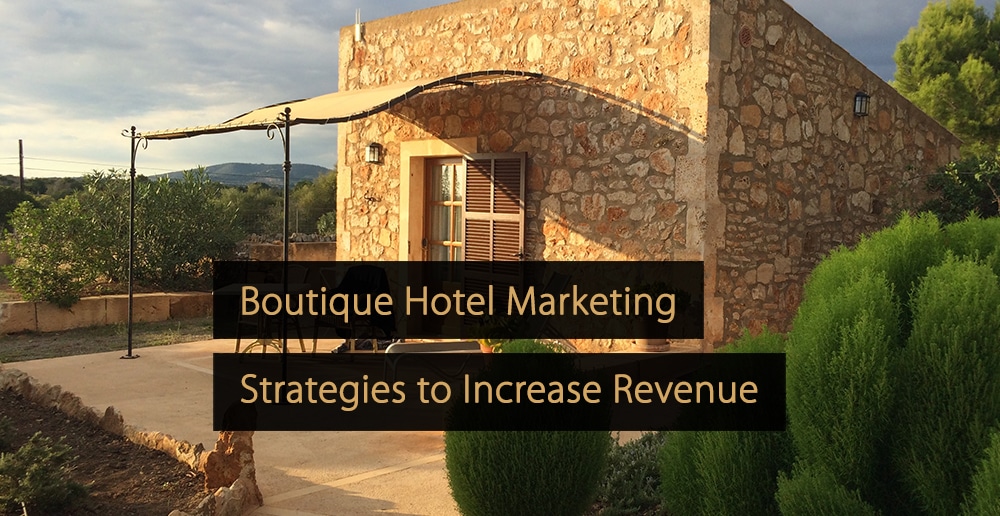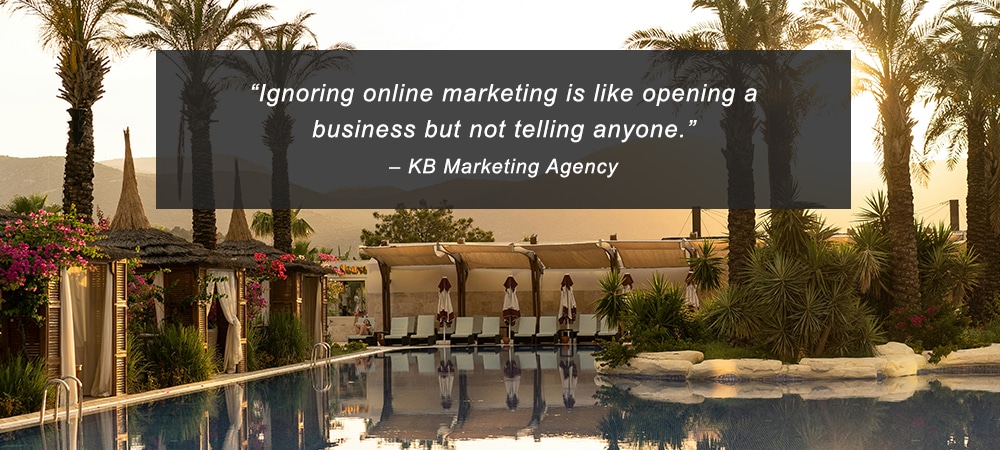A boutique hotel will often appeal to customers looking for unique experiences, picturesque accommodation, and a more personal touch, but your marketing strategies need to highlight what you have to offer. In this article, you will find some boutique hotel marketing tips that can help you increase bookings and boost revenue in 2026 and beyond.
Table of Contents:
- What is a Boutique Hotel?
- How Do Boutique Hotels Differ From Traditional Hotels?
- Creating a Unique Value Proposition for Your Boutique Hotel
- The Role of Digital Marketing in a Boutique Hotel Marketing Strategy
- Top 5 Marketing Tips for Boutique Hotels Increase Revenue in 2026
- Boutique Hotel Website Tips for More Bookings
- Latest Hotel Marketing Trends
- Creating a Hotel Promotional Video
What Is a Boutique Hotel?
You may have heard properties described as boutique hotels, and the name does conjure up a certain image, but defining boutique hotels is made difficult by the absence of mandatory features or traits. A boutique hotel can be described as a small, fashionable hotel aiming to deliver a sophisticated, personal experience for guests.
With that being said, while there are a few hard and fast rules, boutique hotels will often be situated in urban areas. For a hotel to be described as a boutique hotel, it will usually have a unique selling point or qualities not typically seen with chain hotels or larger properties. It is a rapidly growing market – according to the Boutique Hotels Market Report by TechNavio, the Global Boutique Hotels Market size is estimated to grow at a Compound Annual Growth Rate (CAGR) of 6.51% between 2023 and 2027.
Most boutique hotels will have a relatively small number of rooms, which can vary from as few as 10 to around the 100 mark, depending on the property. Although boutique hotels can be part of a chain, they are often independent hotels or hotels that belong to a chain that specifically focuses on boutique properties.
Video: What is a boutique hotel experience?
How Do Boutique Hotels Differ From Traditional Hotels?
Without a strict definition, it can be difficult to pinpoint precisely what separates a boutique hotel from a more traditional property. As a general rule, a boutique hotel will be fairly small yet fashionable. Most properties will have no more than 100 rooms, and these rooms will capitalize on the latest fashion and hotel trends.
Another difference relates to location, with traditional hotels choosing their location based on convenience and access to local amenities, services, and attractions. By contrast, boutique hotels are typically situated in urban areas, focusing on cities’ more aesthetically pleasing parts.
With a boutique hotel, there is typically an emphasis on personalization and complimentary services. Finally, boutique hotels will often have a novelty factor, a unique selling point, or characteristics that are not common throughout the hotel industry, and this makes them great for guests who want to take photos and enjoy unique experiences. In fact, according to the Boutique Hotel Mid-Year Report 2023 by The Highland Group, RevPAR increased for all US boutique hotel classes by a total of 7% compared to 2022.
Creating a Unique Value Proposition for Your Boutique Hotel
To run a boutique hotel successfully, those in hotel management roles must share a vision of what the hotel is trying to be and its unique value proposition (UVP). Essentially, this can be considered an overarching marketing strategy, which explains to customers what makes your boutique hotel distinctive and superior to competitors.
There are many possible options to explore here, depending on the nature of your business. Still, regardless, there needs to be a clear way to appeal to potential customers through boutique hotel marketing and branding.
Do you have a unique location? Is your hotel uniquely themed, or does it look different from other hotels? Do you have unique business practices, like a strong focus on sustainability? Do you make effective use of unique hotel technology?
On a more general level, boutique hotels can often provide a more personalized experience, with each guest receiving more individual attention from hotel staff than they may receive in a traditional hotel. Identify what makes your hotel stand out from rivals, and make this the focus of your marketing efforts.
The Role of Digital Marketing in a Boutique Hotel Marketing Strategy
Almost all hotels now depend heavily on digital marketing. Still, it can be especially important with boutique hotels because they often rely on unique qualities to capture the attention of potential customers, as well as word-of-mouth promotion. Both of these highlight the clear and obvious role that social media and viral marketing can provide.
However, beyond this, boutique hotels can focus marketing efforts on more specific customer demographics. This can be achieved by, for instance, running a content marketing strategy that discusses themes related to your hotel. On top of this, search engine optimization (SEO) can help a boutique hotel to rank high on search engine results pages for specific terms linked to the theme or unique qualities of the hotel.
Table: Examples of Digital Content Marketing for Boutique Hotels
Top 5 Marketing Tips for Boutique Hotels to Increase Revenue in 2026
Marketing is essential for attracting customers to a boutique hotel, but your strategy needs to be carefully designed to accentuate your positives. Below, you can explore five tips to improve hotel marketing strategies and increase revenue in 2026.
1. Reward Customer Loyalty and Incentivize Referrals
A boutique hotel will usually have no more than 100 rooms, and it could have as few as 10 or 20 rooms, so it can pay off to focus your attention on high-value customers, lasting loyalty, word-of-mouth marketing, and referrals to capture unique market segments. Of course, you need to reward loyalty and referrals for this to be successful.
A hotel rewards program can help encourage repeat business and incentivize guests to refer friends to your hotel. Rewards may include discounts or free services. As the unique qualities of a boutique hotel mean that repeat business becomes more likely, focusing on these aspects can help drive up bookings.
2. Impress Customers With Your Website and Social Media
Boutique hotels are more likely to intrigue customers rather than fulfill a basic need, so boutique hotel customers may be less likely to book via an online travel agency and more likely to explore their own online presence. This means making your hotel website and social media channels a core boutique hotel marketing strategy focus.
Your website and social media should include high-quality photographs taken by professional photographers. Try to create a brand identity and ensure consistency across both platforms. Your website must look professional, unique, and striking, but it should also be functional, and mobile optimization is absolutely essential.
3. Create a Blog and Capitalize on Search Engine Results
A great way to capture the attention of potential customers and keep customers engaged with your brand is to create a blog. However, the benefits go beyond this, as blogs also have the power to boost your online visibility through search engine optimization (SEO). Ultimately, this will mean your hotel ranks higher on search engine results pages.
Your blog should cover unique, interesting, or useful topics and should be written with a clear understanding of your boutique hotel and its brand identity. Carry out keyword research, include these keywords in your content, and focus on the topics your customers and target audience are most likely to be interested in.
4. Host a Variety of Events or Functions At Your Boutique Hotel
Many boutique hotels’ unique locations, appearances, themes, and aesthetics make them perfect locations for events and business functions, so you should try to capitalize on this alternative market. Invest in your function rooms, and try to appeal to local businesses that could use those spaces to stage events, meetings, or seminars.
Beyond this business-centric approach, however, there is also enormous scope to host events for ordinary people. These could include weddings, baby showers, birthday parties, work Christmas parties, and more. Use your UVP and the specific qualities of your boutique hotel to appeal to people who want to enjoy unique and memorable experiences.
5. Partner With Local Businesses and Work with the Local Community
Although it is not always the case, most boutique hotels will be independent businesses in urban areas, able to attract local customers. This makes the local community focus of the boutique hotel an important consideration. It pays to try to partner with local businesses and work closely with the local community in general.
There are many possible examples here. For instance, you could create a mutually beneficial relationship with a local photographer and include their services within wedding packages. Alternatively, you could partner with a local restaurant and agree to recommend the other business to your customers.
At a community level, try to pay attention to local causes and provide support when possible. This generates goodwill, translating into customers booking rooms or recommending your hotel to friends and family.
Boutique Hotel Website Tips for More Bookings
When it comes to boutique hotel marketing strategies, your own website has a vital role to play. You can attract direct bookings through this website, which earns you more money. However, you will need to have a high-quality website design, use SEO techniques, add fresh content, and ensure your booking engine is user-friendly.
You can read more about these marketing tips and numerous other ways you can use your website to attract guests to your boutique hotel by reading “Tips To Gain More Bookings With Your Hotel Website”.
Latest Hotel Marketing Trends
To maximize your marketing efforts and draw guests to your boutique hotel, you need to make sure you are capitalizing on the latest hotel marketing trends. These include utilizing hotel chatbots for customer service, using influencer marketing effectively, creating a video marketing strategy, and much more.
To learn about the various ways you can market your boutique hotel and to explore some of the most significant trends in this area, read the “Hotel Marketing; The Latest Trends in the Hotel Industry” article.
Creating a Hotel Promotional Video
Video content plays an increasingly important role within the hotel marketing mix, and boutique hotel marketing strategies can benefit greatly from a professional video that aims to promote the hotel’s unique qualities. However, a promotional video for your hotel needs to be made carefully to deliver the best results.
Read “Tips to Create The Perfect Promotional Hotel Video” for some expert insights into creating a promotional video for your boutique hotel and to view some specific examples of effective hotel video content.
Boutique Hotel Marketing FAQs
A boutique hotel will usually be a fashionable, smaller hotel, emphasizing unique qualities and a personal touch. With this in mind, your hotel marketing strategies must highlight precisely what your hotel has to offer, how it stands out from traditional hotels, and why it is better than other boutique hotels.
Did You Like This Article About Boutique Hotel Marketing?
You might also be interested in the following articles:
- The 7 Star Hotel: Learn Everything About Seven Star Hotels
- Essential Video Marketing Tips for Hotels
- Hotel Amenities: Meet and Exceed Your Hotel Guests’ Expectations
- All-Inclusive Resorts: Successful & Effective Marketing Strategies
- Hotel Website Examples: Important Features to Include & Examples
More Tips to Grow Your Business
Revfine.com is the leading knowledge platform for the hospitality and travel industry. Professionals use our insights, strategies, and actionable tips to get inspired, optimize revenue, innovate processes, and improve customer experience.Explore expert advice on management, marketing, revenue management, operations, software, and technology in our dedicated Hotel, Hospitality, and Travel & Tourism categories.










Leave A Comment